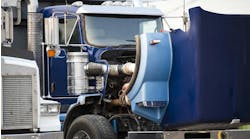Throughout this column space, I have frequently referenced idioms. Nothing rings truer today than the old reliable "cart before horse" scenario playing out in California and nationally as our industry grapples with a zero-emission transition.
There are deadlines stipulated by the Advanced Clean Fleets Rule out of California that have inevitably created more questions than answers over what must happen first. In any case, a normal sequence of events is being abandoned in place of compliance dates and assumptions that everything will fall into place after that. The cart is officially in front of the horse.
Indeed, the trucking industry favors a cleaner environment, so much so that our history proves it. In 36 years, the industry’s emissions output has changed so drastically that it takes 60 of today’s trucks to emit what just one truck did in 1988. The industry will eventually achieve zero, but when it will happen is another question. The when has far-ranging implications for multiple industries across the nation.
As an industry, trucking simply cannot support regulations that set unachievable standards and force motor carriers into a transition on unproven equipment. Range and weight problems continue to raise questions, price tags make electric tractors unaffordable compared to diesel-powered trucks, and current regulation deadlines will likely pass on costs and consequences to the American public.
We must view these regulations realistically: How do they relate to affordability, achievability, and reliability? The Department of Energy estimates that a battery-electric Class 8 truck costs approximately $457,000, while a diesel-powered truck costs around $160,000. That’s a huge difference—particularly when BEVs have yet to prove they can fit into long-haul operations.
See also: A pesky EV question keeps coming up
Unfortunately, pricing is not the only question for carriers across the country. Does this nation’s infrastructure have the capability to support a transition to electric vehicles? What about how they operate during extreme weather conditions? Hot summers and cold winters already come with state-based announcements and warnings that suggest charging vehicles in off-peak hours because of cooling and heating needs in these states. Imagine the strain on our nation's power grid if more fleets need to charge vehicles to deliver freight.
Questions about reliability almost always accompany this conversation. Our nation and professional driving population are built around diesel-powered engines. Over the years, this traditional power source has connected the supply chains. Any change in reliability could dramatically affect the fragile economy and the goods our industry delivers for a nation that needs them.
Achieving comparable range is one thing, but so is how well that vehicle holds up over those miles in tremendous changes in weather and fluctuating temperatures. As we know, freight is not delivered in a vacuum—not all days are sunny and 72 degrees. It can be below zero or well above 100 degrees, and tomorrow’s truck will need to deliver in those elements, some of which can significantly affect the charge life of a battery.
Indeed, we hold to the notion that our nation needs environmental improvements so that our grandchildren will inherit a planet in a better condition than when we did—and our industry continues to demonstrate that notion. However, we cannot simply provide a deadline, wave a magic wand, and pray that it happens. Any of these changes must be strategic and consider the unintended consequences of furthering a date-based rule without fully understanding the work behind the scenes.
The freight delivery model began with a cart and a horse. Let's ensure we maintain the correct order when considering the potential impacts of the future.



